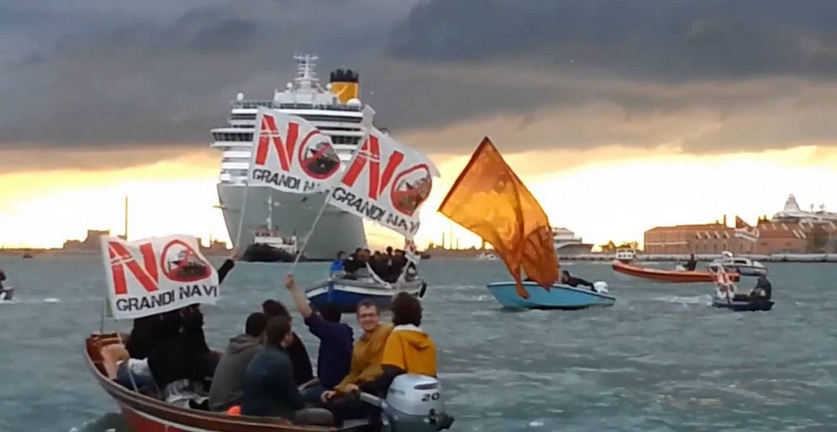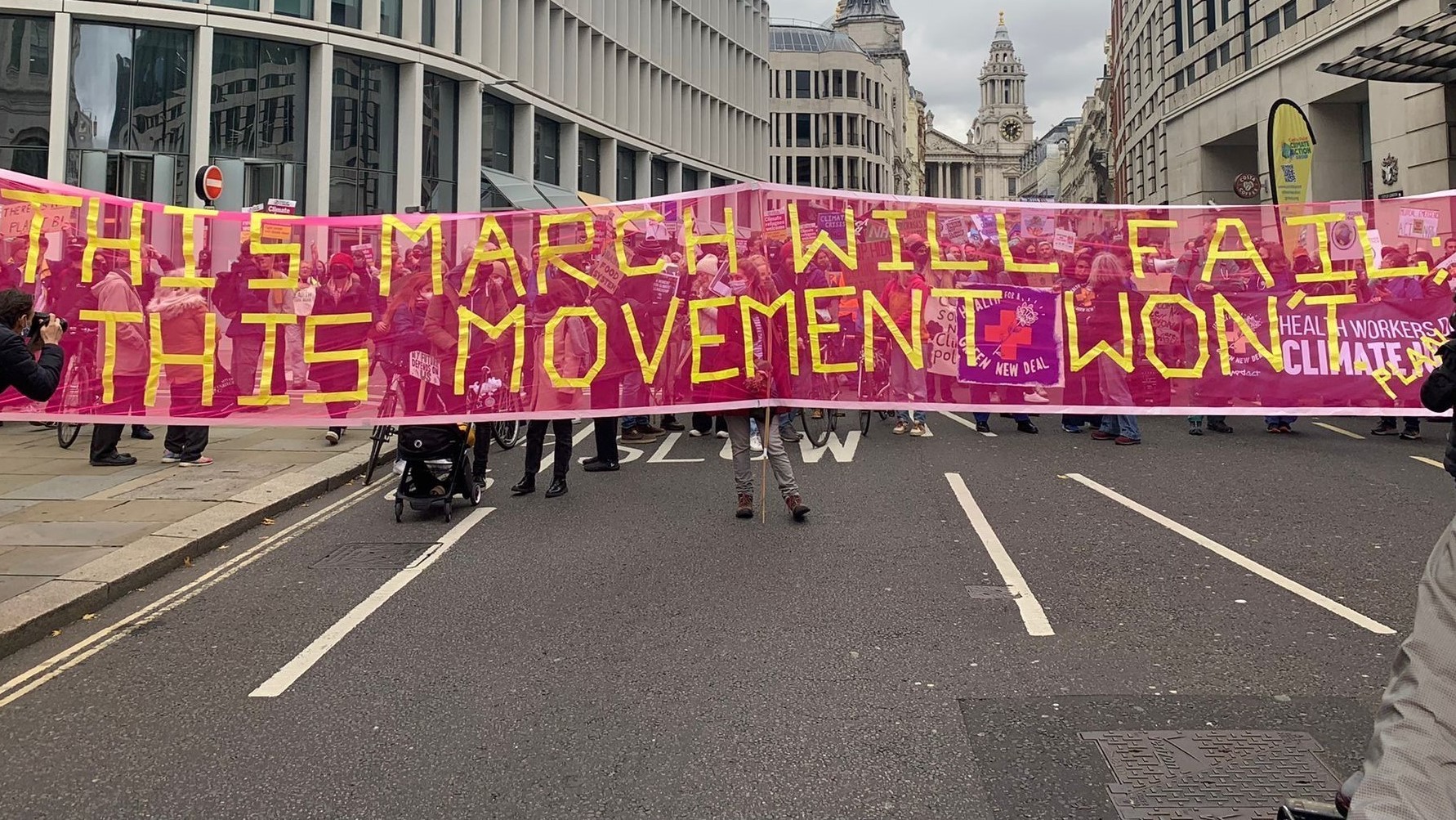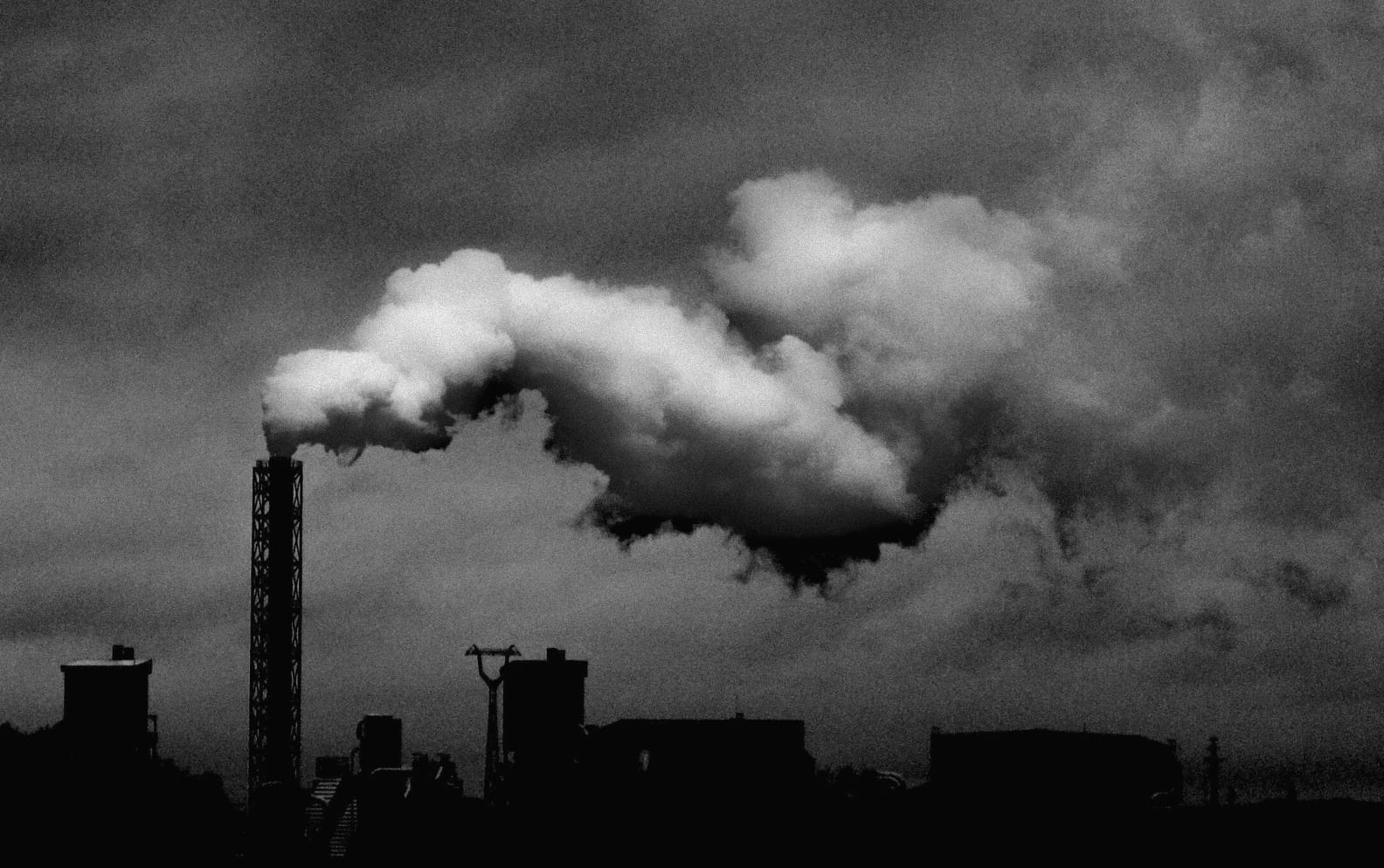By the Veneto Environmental Committees
Between 4 and 8 September 2019, the Venice Climate Camp will take place. Activists from Europe and beyond are invited by the organisers – Venice’s No Grandi Navi Committee and Fridays for Future Venice – for five days of discussions and protests to fight climate change through system change. The International Film Festival in Venice will be used as a global stage to expose the hypocrisy of green capitalism. To give more information on the political perspective underpinning this climate camp, we have translated into English a statement published in January 2019 on Globalproject.info by the Veneto Environmental Committees, of which the No Grandi Navi Committee is part.
Climate change is a slippery matter. We know it exists thanks to the scientific data showing the severity of the current situation and the official reports painting apocalyptic scenarios. However, it is not possible to experience it individually. Climate migrants are adding themselves to those already on the move because of wars and other forms of violence. We are more and more subject to extreme meteorological phenomena. Doubt however remains. How is it possible to be certain that a specific meteorological anomaly is really caused by the climate crisis? Moreover, climate change produces the paradoxical outcome that the more human science becomes precise in its calculations and predictions, the more the problem is understood, and the less we feel socially capable to give a radical response to it. How is it possible to reduce CO2 net emissions to zero by 2050, as the famous IPCC report says? Somebody has highlighted how climate change shifts the equation for social movements. In the past, each struggle had the “substance of history” as the background to its development. Today, the very substance of history is at stake.
Yet, there is no time to be lost. It’s time to open the window, leave despair behind and look differently at the situation. Out there, in spite of the theoretical complexity of the phenomenon, large sections of society are beginning to make the issue central to their cultural life and get to grips with its reality. This is not exclusively about the millions of people who are forced to migrate from the Global South, from the lands dried out by colonialism and hit by droughts and desertification. Think about Europe and thus Italy, where an irrational development model forces us to live with ever more intolerable levels of pollution, to witness the eternal search for new fossil fuels (and the construction of infrastructures for their extraction), to suffer deforestation and exhaustion of the soil and other phenomena impairing the capacity of communities to push back effectively against a climate crisis that is already happening. In reality, all of these elements are part of a developmental model that our country knows all too well, that of large-scale infrastructure projects. In our own backyard too, we live under the pillage of extractive capitalism. What is being exploited are our territories, that is the “life network” keeping together human and non-human life.
Think about the TAV [High Speed Train] in Val di Susa. This project is a war simultaneously against the environment, the communities, and against an equitable distribution of wealth. If the TAV were constructed without opposition, it would cause the destruction of a mountain eco-system on top of the incalculable emissions from a building site that will last at least twenty years. Meanwhile, the social forms that the Val di Susa locals have historically accumulated and strengthened around their struggle are already being attacked by state repression. Public resources that could be spent differently, mainly to secure our territories through diffuse and targeted infrastructural projects, or in public education and health, are transferred to unethical companies and a totally unsustainable project.
The 19th century idea of Progress, which belongs to the past but has never really disappeared, the idea according to which prestige is measured in metres, tonnes and acres in a competition for grandeur among nation-states, is the cultural framework for large-scale infrastructural projects. They need to be gigantic, like something from the age of the Pharaohs and, above all, structurally irreversible.
In Italy, entrepreneurs and industrial firms have secured a system of guaranteed profits, with little innovation and much parasitism. Institutional political actors, for their part, are still striving for the prestige stemming from the large-scale projects, while the temptation of corruption is always present.
This lethal mix was certainly there in the case of MOSE [dam system in Venice], an uncompleted project, obsolete since the time of its conception, and the trigger for a real mafia-like system that has burnt about 1.5 million euros in corruption and wasted 4 million more in construction works – all courtesy of the tax-payers of course. Moreover, even in the hypothesis that MOSE will be completed, it will be undermined by the rising sea levels that have been foreseen for the next decades. In fact, with the future sea levels, the MOSE dams will need to remain closed for much longer than was anticipated, causing a fall in the exchanges of oxygen between the lagoon and the sea, possibly killing the lagoon’s eco-system and its cultural, social and economic ecology. The MOSE example teaches us that the large-scale infrastructural project model must be abandoned, because its irreversibility does not take into account the future climate changes that will require new adaptation capacities from the territories. But such capacities will not come without a struggle, they need to be fought for or they will never be achieved.
To be clear, this does not mean that we should be satisfied with piecemeal improvements without questioning the whole capitalist framework. We are not just criticising the current news of the shameful U-turn of the 5-Star Movement’s government, especially on the issue of large-scale infrastructural projects. In fact, it will not be sufficient to stop the TAV in Val di Susa and to delay the drilling in the southern Italy to erase the shame of ILVA, Terzo Valico, TAP and MUOS. It will not be enough to erase 5-Star Movement’s inaction on the large ships and the MOSE in Venice, and the list could go on and on. What we are striving for is a transformation of the developmental system, and this will only be possible through a radical, transnational and plural social movement carrying out a material critique of capitalism.
Sustainable Development in Capitalism Is but a Mirage Aggravating the Climate Crisis
Let us leave behind the sustainability rhetoric. This does not mean that we don’t need to struggle on specific issues to mitigate environmental destruction, but our political horizon obviously cannot be that of the UN’s governmental Conferences of the Parties (), which in any case are being made more and more ineffective by the new negationism of Trump, Bolsonaro, and the like.
Following Jason Moore’s suggestion, we substitute the term “Anthropocene” with “Capitalocene” to highlight clearly the historical responsibility of capitalism in the current climate crisis. It is clear that the struggle against the new forms of exploitation in the time of the gig economy and digital platforms is crucial, just like it is important to demand low-environmental-impact employment. Think, for example, of how the logistics sector adds hard and precarious work conditions to enormous amounts of emissions.
We also need to admit that for too long the movements have underestimated the shaping of nature by capital, allowing the latter to march on the domains of reproduction (care work performed predominantly by women), domestic work, and “cheap nature”. This is one of the reasons why among the protagonists of environmental movements in Northern Europe there are feminist, trans and queer subjectivities.
If degrowth is, understandably, a priority for many, degrowth in capitalism is an illusion. It is not just that capital structurally needs growth to reproduce itself, it is also that – without systemic change – it is unrealistic to ask the exploited and colonised to support degrowth. The proponents of degrowth are people we can cooperate with, especially because they are part of our struggles and committees, but this co-operation should be based on an anti-capitalist understanding of degrowth, against the belief that individual modifications in patterns of consumption or a return to small and homogeneous communities can be sufficient tools against the climate crisis (this is a simplification for the sake of brevity). The poor, the oppressed, those who don’t have much, won’t give up what they have if the very notion of pleasure is not revolutionised, that is, if we don’t affirm through our social actions and our struggles that happiness cannot be reduced to an individual capacity for consumption.
What does this mean? Do we need to erase the issue of lifestyle (how we live and behave, even individually, within climate change) from our struggles and make everything about collective organisation and action? Not at all, the organisation of the movements within the climate crisis cannot put aside a renewed attention to lifestyles: food, energy, waste, transport, etc. It is not possible to separate organisation and lifestyle, collective and individual ethics. We need to learn a lot on this topic if we want to broaden our sphere of action.
The connection between organisation and lifestyle must also be instrumental to defuse the psychological mechanism in which individual responsibility for climate change becomes a feeling of guilt that acts as a universal equaliser. We are not all equally responsible for the climate crisis. There are racial, class, and gender privileges that diversify the weight of individuals and communities, and this in turn cannot be separated from the historical responsibility of the capitalists, including the current financial elites. We embrace the slogan: “Make the rich pay the ecological transition”. The responsibility to build an ethics able to face the crisis is universal, but the great transnational concentrations of wealth and capital must be corroded in order to create the necessary resources.
Commonwealth
The commons are not commodities, they become common not by their nature but only when a shared usage is won. They are material and immaterial, rural and urban. Often these dimensions are interpenetrating, as in the case of Venice, where the so-called nature (the water, the flora, the fauna, the lagoon) cannot be separated from the urbanised archipelago and its life forms. This interlacement has allowed the sedimentation of a collective symbolic “capital” that is unique in the world. What is far from unique is the destructive effects of mass tourism on the communities (of which the large cruise ships are the most arrogant instance). Commercial mass tourism is jeopardising a wealth of specific life forms, a priceless heritage of hundreds of historical cities. Let’s not forget, in fact, that tourism is one of the largest world industries, and this is not a recent phenomenon.
Why are we convinced that the concept of commonwealth can play a crucial role in our struggles? Because the public, and not just the private, is today more and more subordinated to capitalism. Just demanding a well-functioning public sector is not timely today. The public sector is functioning but, especially since the inception of neoliberalism, it functions against the commonwealth.
In the case of the campaign against large-scale infrastructural projects, we don’t think nationalisations are the solution. If we want to talk about sovereignty, let’s talk about the historical importance of the struggles for food sovereignty, especially in the Global South, struggles that have little to do with nostalgia for the reassuring borders of the nation-state. Moreover, the harmfulness of a large-scale project does not change with private or public ownership and the pillage of the system we oppose is based on a tight cooperation between states and private companies. Isn’t this very cooperation visually represented in the institutional consensus displayed in recent demonstrations for large-scale projects? Here Lega and the Democratic Party marched together, accompanying the entrepreneurial associations.
The commonwealth is a battlefield. In this battle, the so-called “political use of the law” (experimented with especially at the municipal level) is an important tool, but it is not exhaustive. The ‘becoming common’ of a good is seldom achieved without a process of struggle to reclaim it, without a shift in the balance of power. Without social conflict, the law remains an obstacle to the commonwealth, not an ally. We are not interested in the virtuosity of the jurist, but in the legal dimension as a terrain for further struggles. Sometimes a commons can be secured thanks to a legal measure, sometimes it can be secured only by keeping it outside of the law. In any case, a revival of the discussion on the commons can offer the movement against large-scale projects and for climate justice breathing space and important tools.
The Committees
Our goal is clear and ambitious. We must not build a stage to represent ourselves, this is not about the survival of single organisations or affinity areas, and neither about making electoral coalitions and parties or seeking hegemony over that meagre space that the reactionary forces have left us. Let us avoid re-enacting the sadness of old shows. We will build the necessary organisational tools, but our desire is to see the birth of a mass movement, a broad space, a real and radical social mobilisation over the long period. Apart from the good intentions, this is the only condition for a breakthrough.
It is however useful to remind ourselves that we are not starting from zero. The territorial environmental committees – both the historical ones and the new arrivals – are a unique wealth in which years of struggles, militant knowledge, experiences and social ties are collected together. A great wealth, which is however limited by its difficulties – apart from the many solidarity instances – in building a common platform, a platform that wouldn’t forget the particular conflicts but that would find more strength in a common perspective and process.
We believe the challenge is double. First, as territorial environmental committees, we need to strive for a breakthrough. Maybe this has not emerged clearly, but all of us, in our struggle against useless and imposed infrastructural projects, are struggling against a developmental model that is contributing to aggravate the climate crisis. On the other hand, the millions of people that in Italy (but also in Europe and the world) feel the urgency to fight against climate change and are against the large-scale projects do not have (at least in Italy) a social movement space that, with radicality and intelligence, could offer them a terrain to put in common their forms of life and struggle.
The question of the large-scale projects is certainly a contradiction in the self-styled “government of change”. We believe that this contradiction must be amplified in order to win concessions. We need to act in a quick and sustained way, like we did in the last months. We cannot accept any notion that the incumbent government should be allowed to operate without opposition. Lega is leading, the 5-Star Movement is oscillating in a cost-benefit analysis and a fake citizenship income, trying not to lose consent (…). What does this demonstrate? That bargaining spaces can be opened only through struggles. After all, how is it even possible to trust Casaleggio’s participative mechanisms?
Secondly, it is appropriate to clarify that we need to be as open as possible. We need to create a dialogue with many, not only with the tens of territorial committees that have been already mobilising for a long time, but also with those individuals and organisations that have carried out climate activism in the past, with the networks working for the commons, with the degrowth groups, with the feminist and queer subjectivities, with Non Una di Meno, the social centres, and the municipalist experiences.
Comitato No Grandi Navi, Venezia
Comitato No Dal Molin, Vicenza
Comitato Zero PFAS, Padova
Comitato No Pedemontana, Treviso
Opzione Zero, Mira





